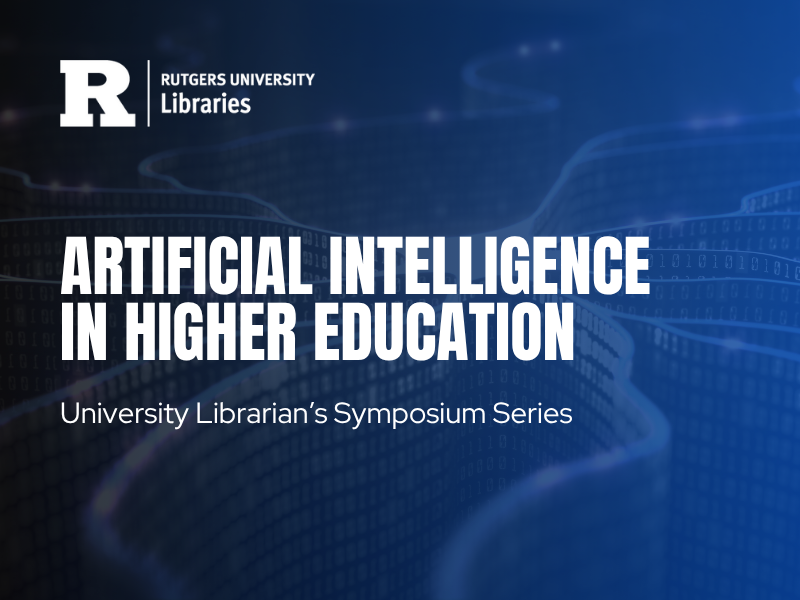
New Symposium Series to Examine AI’s Role in Higher Education
Universitywide
Rutgers University Libraries are introducing a new symposium series designed to engage the entire Rutgers community on timely topics in higher education, focusing on a different theme each year.
The University Librarian’s Symposium Series will launch November 10 with an inaugural program addressing the theme for the 2025–2026 academic year: Artificial Intelligence in Higher Education. Throughout the year, symposia exploring this theme will address key issues such as university policies on acceptable use and academic integrity, Rutgers’ AI and data initiatives, the challenges and opportunities AI presents, and strategies for supporting student success in an evolving technological landscape.
“As the intellectual hub of the university, the Libraries are well positioned to convene this important conversation,” said Consuella Askew, vice president for university libraries and university librarian. “With many experts throughout Rutgers representing various disciplines and facets of AI, I'm looking forward to the insights we can gain from an ongoing, universitywide dialogue.”
The inaugural event on November 10, AI in Teaching and Learning at Rutgers: A New Chapter in Higher Education, will be held in person at the Archibald S. Alexander Library in New Brunswick (Teleconference Lecture Hall) from 8:30 a.m. to 4 p.m. This program will delve into institutional strategy, infrastructure, and leadership in AI and data science, with expert presenters from across the university and within the Libraries. Capacity is limited for this event, and advance registrations are fully booked. A recording of the program will be posted on the Rutgers University Libraries website after the event so that those who were unable to attend can benefit from the discussions.
Featured Speakers
Lauren Goodlad, Distinguished Professor of English and Comparative Literature, School of Arts and Sciences, editor of the Critical AI journal, and the chair of the interdisciplinary Critical AI initiative at Rutgers, will deliver the keynote: “Teaching Critical AI Literacies: A New Frontier in Higher Education.”
A morning segment on initiatives at Rutgers will feature:
- Stephen Burley, University Professor and Henry Rutgers Chair in the Department of Chemistry and Chemical Biology, School of Arts and Sciences, and interim director of the Rutgers Artificial Intelligence and Data Science (RAD) Collaboratory, presenting “Rutgers Artificial Intelligence and Data Science (RAD) Collaboratory: Deep Learning, Deep Connections”;
- Tracie Marcella Addy, founding director, and Crystal Quillen, assistant director of teaching and learning scholarship, both of the Institute for Teaching, Innovation, and Inclusive Pedagogy, presenting “The Teaching & Generative AI Pathways Program: Supporting Instructors in Their Courses”; and
- Rick Anderson, director of emerging technologies, and Suparna Sinha, instructional designer, both from University Online Education Services, as well as Ines Rauschenbach, associate teaching professor in the Department of Biochemistry and Microbiology, with presentations on “Cross-disciplinary Collaboration: The Intersection of Research, Instruction, and AI tools.”
An afternoon panel, “Rutgers University Librarians Share their Perspectives on AI in Information Literacy Instruction and Research,” will feature Katherine Anderson, reference and instruction librarian, Paul Robeson Library, Camden; Leslin Charles, instructional design librarian and liaison to the Graduate School of Education, James Dickson Carr Library, Livingston Campus; Francesca Giannetti, digital humanities librarian, Alexander Library, College Avenue Campus; and Mei Ling Lo, science research librarian, Library of Science and Medicine, Busch Campus.
Consuella Askew, vice president for university libraries and university librarian, will provide welcoming remarks and Michelle Norin, senior vice president and chief information officer, will deliver opening remarks.
For the Media
For questions about this story, please contact: